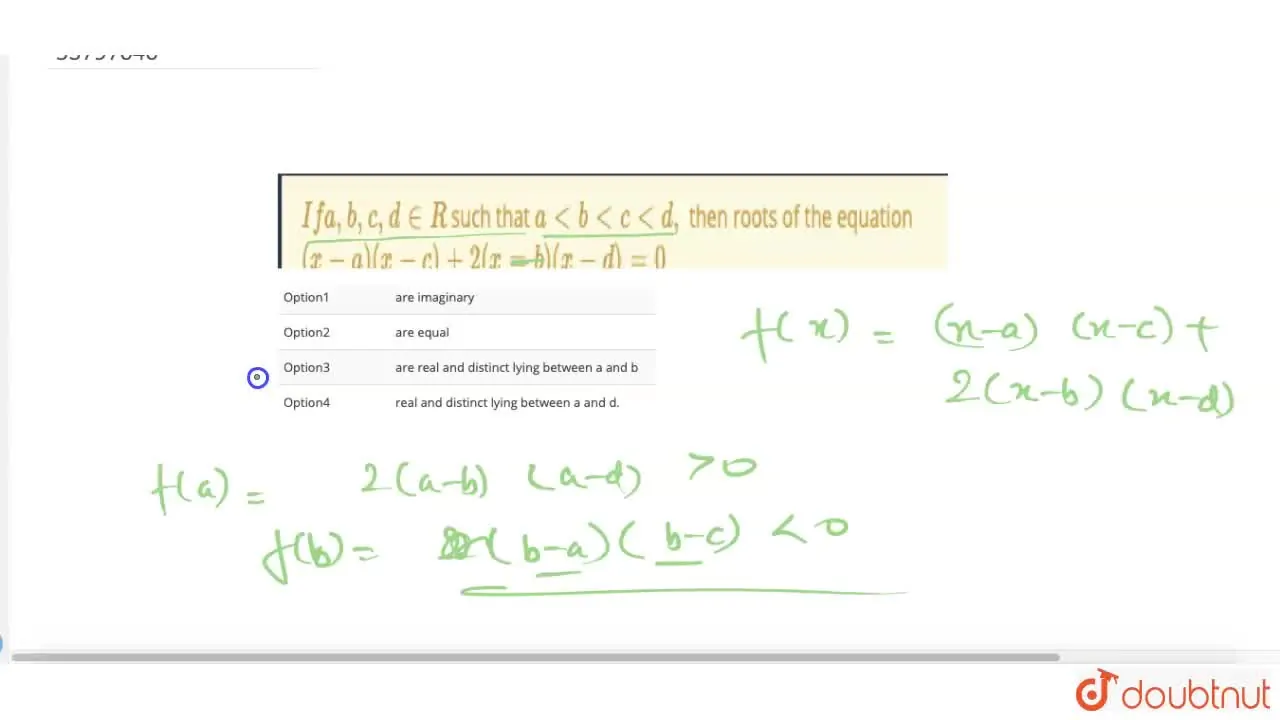such that then roots of the equation
are imaginary
are equal
are real and distinct lying between a and b
real and distinct lying between a and d.
The correct Answer is:D
Let . Then,
and,
Thus, one root of f(x) = 0 lies between a and b and another root lies between b and d. Hence, the roots of the given equation are real and distinct and between a and d.
Related Playlists
- BOOK - OBJECTIVE RD SHARMACHAPTER - QUADRATIC EXPRESSIONS AND EQUATIONS EXERCISE - Section I - Solved Mcqs123videos
QUADRATIC EXPRESSIONS AND EQUATIONS
- BOOK - OBJECTIVE RD SHARMACHAPTER - QUADRATIC EXPRESSIONS AND EQUATIONS EXERCISE - Section II - Assertion Reason Type22videos
QUADRATIC EXPRESSIONS AND EQUATIONS
- BOOK - OBJECTIVE RD SHARMACHAPTER - PROBABILITY EXERCISE - Chapter Test45videos
PROBABILITY
- BOOK - OBJECTIVE RD SHARMACHAPTER - SEQUENCES AND SERIESEXERCISE - Chapter Test60videos
SEQUENCES AND SERIES
Similar Questions
If a<b<c<d, then the roots of the equation (x-a)(x-c)+2(x-b)(x-d)=0 are
View SolutionIf a<b<c<d then show that (x−a)(x−c)+3)x−b)(x−d)=0 has real and distinct roots.
View SolutionIf a<b<c<d, then the eqution 3(x−a)(x−c)+5(x−b)(x−d)=0 has
View SolutionIf c<a<b<d, then roots of the equation bx2+(1−b(c+d)x+bcd−a=0
View SolutionIf a<b<c<d, then the equation (x−a)(x−c)+2(x−b)(x−d)=0 has ( a) Imaginary roots (b) equal roots (c) distinct real roots (d) none of these
View SolutionIf a<b<c<d, then the quadratic equation (x−a)(x−c)+2(x−b)(x−d)=0 has its roots
View SolutionIf a<b<c<d then show that (x−a)(x−c)+3(x−b)(x−d)=0 has real and distinct roots.
View SolutionIf a,b,c,d are four consecutive terms of an increasing A.P., then the roots of the equation (x−a)(x−c)+2(x−b)(x−d)=0 are a. non-real complex b. real and equal c. integers d. real and distinct
View SolutionLet a,b,c , d ar positive real number such that ab≠cd, then the roots of the equation: (a2+b2)x2+2x(ac+bd)+(c2+d2)=0 are :
View SolutionIf a,b,c,d are four consecutive terms of an increasing A.P., then the roots of the equation (x−a)(x−c)+2015(x−b)(x−d)=0 are
View Solution


